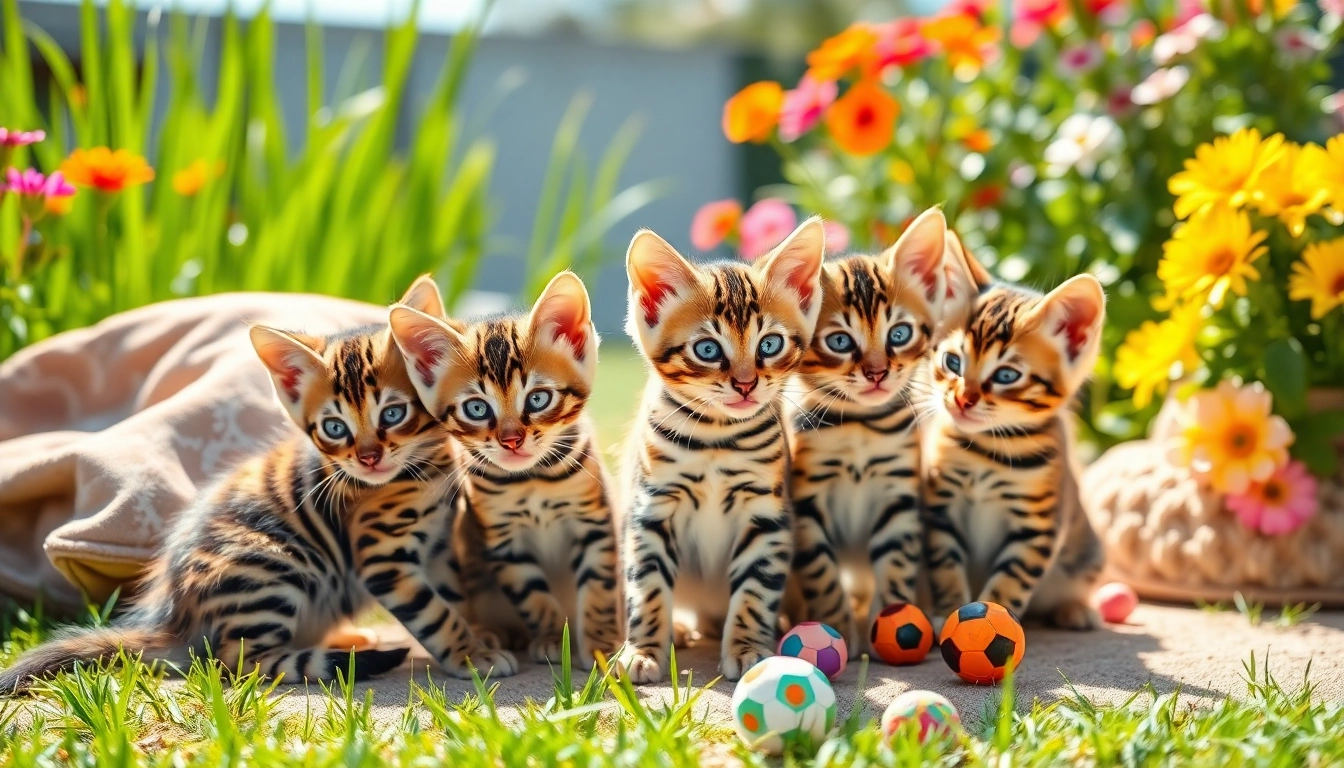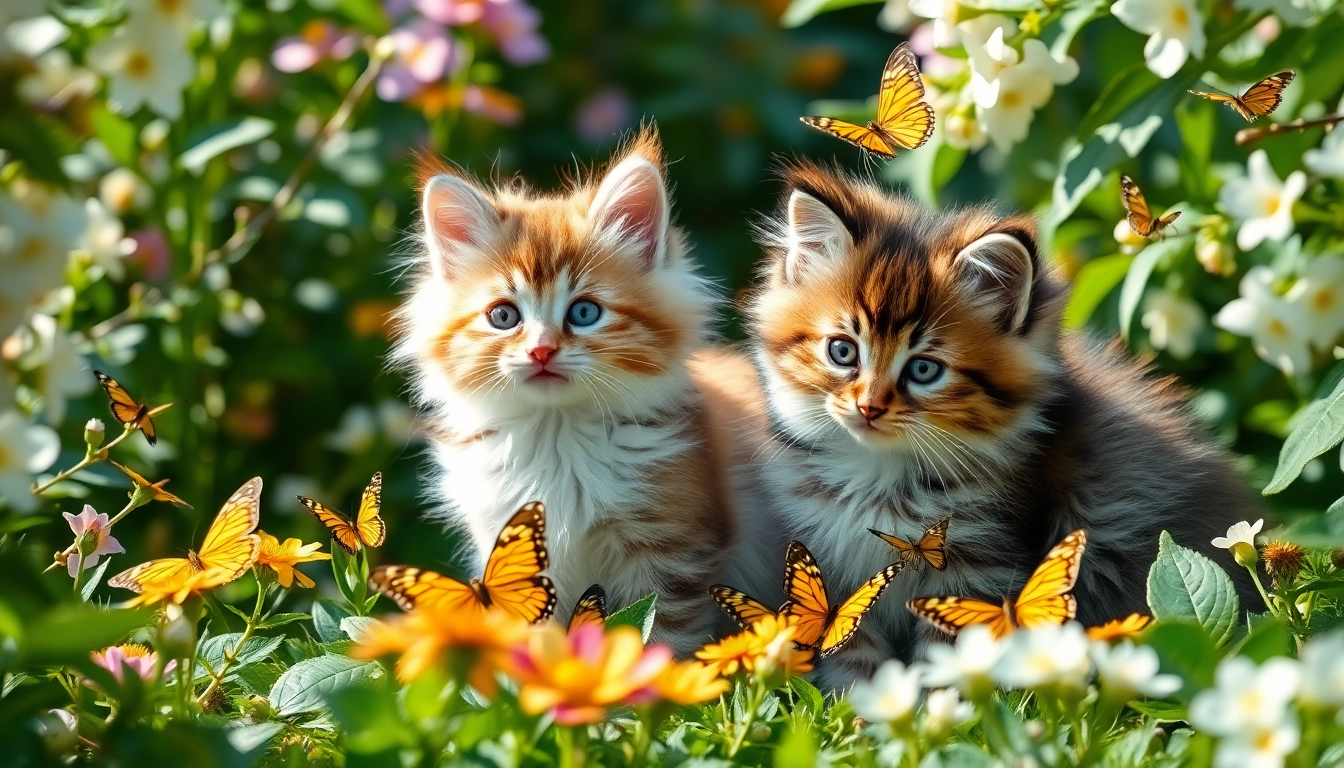Understanding Bengal Cats: A Brief Overview
Bengal cats are one of the most distinctive and sought-after breeds due to their striking appearance and lively temperament. Known for their large, dramatic spots and rosettes reminiscent of wild leopards, these cats are a hybrid breed, a product of crossing domestic cats with the Asian leopard cat. Their vibrant personalities and active nature make them excellent companions for the right families. For those considering Bengal breeders in Orange County, it’s crucial to understand what sets this breed apart.
The Bengal Breed Characteristics
The Bengal breed is characterized by its muscular build, high energy levels, and a playful demeanor. They often weigh between 8 to 15 pounds, with males typically being larger than females. Their coat, which is soft and luxurious, comes in various colors including brown, silver, and snow, adorned with striking markings. Bengals are known for their intelligence and curiosity, often needing interactive play and engaging environments to thrive.
One defining trait of Bengals is their affinity for water; they often enjoy splashing around in sinks or playing with running water. Their sociable nature makes them amenable to living with other pets and even children, given proper introductions. However, potential owners should be aware that these cats require more attention and stimulation than average breeds.
The History of Bengal Kittens
The Bengal breed history dates back to the 1960s when Jean Sugden Mill began experimenting with hybridization. The goal was to combine the domestic cat’s affectionate nature with the exotic look and vitality of the Asian leopard cat. After several generations, the breed was officially recognized, and Bengals began to gain popularity in the late 20th century.
The gene pool of Bengals has been carefully managed over the years to mitigate health risks and enhance desirable traits. As interest surged, breeders focused on producing kittens with unique patterns and colors while adhering to breed standards set forth by organizations such as The International Cat Association (TICA).
Common Myths About Bengal Cats
Despite their popularity, there are numerous misconceptions about Bengal cats that can deter prospective owners. One myth is that Bengals are wild and aggressive. In reality, while they exhibit playful and sometimes high-energy behavior, they can be affectionate, loyal companions when socialized properly.
Another misconception is that Bengals require extensive outdoor time. While they do love exploration, it’s important to create safe indoor environments for them, as outdoor settings can expose them to various risks. Additionally, some believe that Bengal cats are hypoallergenic; while they produce less Fel d 1 protein compared to other breeds, they are not entirely hypoallergenic.
Choosing Bengal Breeders in Orange County
Choosing the right breeder is paramount for prospective Bengal owners, especially in Orange County, where numerous breeders can be found. It’s vital to select someone who prioritizes health, temperament, and ethical breeding practices.
What to Look for in a Reputable Breeder
When searching for reputable Bengal breeders, consider the following criteria:
- Health Testing: Reputable breeders perform health screenings on their breeding cats to ensure they aren’t passing on genetic conditions common in the breed, like hypertrophic cardiomyopathy (HCM).
- Transparency: A good breeder will be open about the health history and lineage of the kittens. They should provide a pedigree and any relevant health certificates.
- Living Conditions: Visit the breeding facility if possible. The environment should be clean, spacious, and conducive to raising happy, healthy cats.
- Socialization Practices: Proper socialization is critical for Bengals. Ensure the kittens have ample interaction with people and other pets before adoption.
- Support After Sale: A reputable breeder will offer guidance even after you take your kitten home, helping with diet, health concerns, and behavioral issues.
Questions to Ask Potential Breeders
When you contact breeders, prepare a list of questions that can help gauge their experience and dedication:
- What is your breeding philosophy?
- Can you provide references from previous customers?
- How do you socialize your kittens?
- What kind of health guarantees do you offer?
- Are you affiliated with any cat registries?
Taking the time to ask these questions can help you make an informed choice and ensure that your new kitten comes from a responsible setting.
Importance of TICA Registration
When looking for Bengal breeders, consider those registered with TICA or the Cat Fanciers’ Association (CFA). TICA registration ensures that the breeder adheres to specific standards concerning breed practices, animal welfare, and ethical breeding. Furthermore, TICA provides a platform for breeders to showcase their cats, participate in competitions, and continue their education on responsible breeding standards.
For potential Bengal owners, purchasing from a TICA-registered breeder also increases the likelihood of acquiring a cat free from inherited health issues and of superior genetic quality.
Health Considerations When Adopting Bengals
Prioritizing the health of your Bengal kitten is essential. Bengals are generally robust but can inherit specific health issues. Awareness of these conditions can prepare you as an owner for proper care.
Common Health Issues in Bengals
The most common health problems in Bengal cats include:
- Hypertrophic Cardiomyopathy (HCM): The most prevalent heart condition in cats, leading to thickening of the heart muscle, potentially resulting in heart failure.
- Chronic Kidney Disease (CKD): A common illness in aging cats that can lead to renal failure if not managed correctly.
- Gum Disease: Bengals can be prone to dental issues, necessitating regular check-ups and dental care.
- Hypertrophic Osteodystrophy: A developmental disease in young kittens affecting bone growth.
Vaccination and Health Check Requirements
Keeping your Bengal kitten healthy begins with proper vaccinations. It’s vital to schedule an initial check-up with your veterinarian, who will recommend vaccines against common diseases such as feline distemper (FPV), calicivirus (FCV), and rhinotracheitis (FHV). Additionally, regular health check-ups can catch any potential health issues early.
Understanding Genetic Testing
Genetic testing has become increasingly significant in responsible breeding. Breeders can screen their cats for genetic conditions associated with the breed. Results can indicate genetic predispositions, allowing breeders to make informed breeding decisions and potential owners to take preventative measures. As a new owner, you should inquire if genetic testing has been conducted on the kitten’s parents.
Bringing Your Bengal Kitten Home
Once you’ve found your Bengal kitten, preparing for its arrival is essential. Proper planning can make the transition smoother for both you and your new pet.
Setting Up a Comfortable Living Space
Your home should be welcoming and safe for your Bengal. Create a designated area for your new kitten with the following essentials:
- Comfortable Bed: Provide a cozy bed in a quiet space where the kitten can feel secure.
- Litter Box: Introduce a litter box early on and ensure it is easily accessible.
- Toys: Provide toys that promote active play, challenging their intelligent and playful nature.
- Scratching Posts: Invest in scratching posts to protect your furniture and satisfy your kitten’s instinct.
Initial Care and Diet for Your New Kitten
Feeding your Bengal kitten a high-quality diet tailored to its needs is crucial. Select cat food that contains high protein, essential fatty acids, vitamins, and minerals. Consult your veterinarian for specific recommendations regarding dietary requirements, portion sizes, and feeding schedules. Transitioning slowly to any new food can prevent digestive upset.
Socialization Tips for Bengal Cats
Bengals are known for being social cats. Begin socialization as soon as your kitten arrives home. Allow them to explore their new environment at their own pace while also providing opportunities to mingle with family members and other pets. Gradual exposure to different people and situations can help them develop into well-rounded adults.
Finding the Right Bengal Kittens for Sale in Your Area
Once you’ve familiarized yourself with Bengal cats and their needs, it’s time to find where to adopt one. Orange County offers various options, and making the right choice is vital to ensuring a happy, healthy new family member.
Local Listings and Resources for Bengal Kittens
Searching online can provide insights into trusted breeders and adoption sources in Orange County. Local breed clubs, veterinary offices, or pet expos might also list reputable breeders you can contact. Always research reviews and testimonials to gauge the experiences of other owners.
Online Versus In-Person Purchases
While the internet offers convenience during your search, meeting the kitten and the breeder in person can provide essential insights into the animal’s living conditions and socialization. Avoid relying solely on online purchases without personal interaction to ensure responsible handling and breeding practices.
Cost Expectations and Financial Planning
Understanding the financial commitment involved when adopting a Bengal is crucial. Initial costs can range from $1,000 to $5,000, depending on the breeder’s experience, the kitten’s pedigree, and market demand in your area. Additionally, ongoing costs such as food, regular veterinary care, grooming, and pet insurance should be estimated in your budget.



